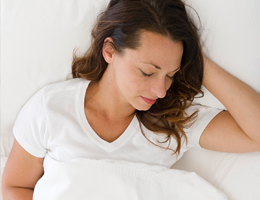
July 23, 2021—When you get a good night's sleep, you might want to thank your brain's natural production of melatonin. It's a hormone that regulates your sleep/wake cycle and helps give you that blissful rest.
Today, melatonin supplements made from synthetic or natural sources have become a popular short-term treatment for conditions related to sleep timing, such as jet lag.
If you're considering a melatonin supplement, here are a few facts to know.
Does it work?
Melatonin supplements add to the natural melatonin levels that your brain produces at the end of each day when it's time to go to sleep.
According to the National Center for Complementary and Integrative Health, studies have shown that these over-the-counter treatments may help with sleep timing issues such as jet lag, delayed sleep-wake phase disorder and some sleep disorders in children.
But there's not enough strong evidence to show that melatonin supplements can help people who have chronic insomnia or do shift work.
Is it safe?
Short-term use of melatonin supplements appears to be safe for most people, including children. However, there's not enough research yet to show how safe it is for long-term use.
To be safe, remember these guidelines:
- Ask about interactions. Talk with your doctor about how melatonin might react with other medicines you take, especially if you take blood thinners or have epilepsy.
- Watch for allergic reactions. Ask your doctor what signs to look out for.
- Don't take it if you're pregnant or breastfeeding. There has been no safety research for this group.
- Take care if you're older. Daytime drowsiness may be higher for older people. And people with dementia should not take melatonin.
- Be careful with the dose. Melatonin is regulated by the U.S. Food and Drug Administration as a dietary supplement, not as a drug. That means some products may not always contain the amount of melatonin listed on the label, which can make accurate dosing more difficult. Talk with your doctor about what's right for you.
Are there other things I should try first?
If you have trouble sleeping, the American Academy of Sleep Medicine recommends trying a few simple changes before taking melatonin. For instance, it may help to:
- Keep a regular sleep schedule.
- Create a relaxing bedtime routine.
- Make your bedroom quiet and cool at night.
- Avoid using screens for at least 30 minutes before going to sleep.
- Avoid caffeine in the late afternoon or evening.
If changes like those aren't helping, talk to your doctor about what might be keeping you up at night. Together, you can make a well-informed decision about what's right for you.
Think you might have a sleep disorder? Take this quick assessment before you talk with your doctor.